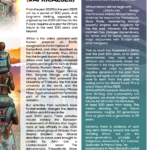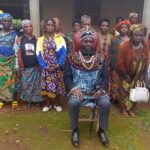By Princeley Njukang

In a dramatic and closely watched election, Mbah Eric Mbah has been re-elected President of the Cameroon Bar Association for a second two-year mandate. The incumbent Batonnier emerged victorious with 1,001 votes, outpacing surprise challenger Ngo Minyongo who scored 749 votes, followed by Anne Yoland Ngoula Fotso with 338 and Phillips Memong with 265. The overnight ballot, which held legal practitioners in suspense until the early hours of July 15 at the Yaoundé Multipurpose Sports Complex, ended with a decisive win that confirmed Mbah’s strong hold within the legal community.
His re-election was especially well received in the Anglophone regions of the North West and South West, where many view his leadership as an important step toward inclusion and recognition within the national Bar. But behind the celebrations lies a weighty task: delivering on the promise of constructing a CFA 6 billion Bar Head Office in Yaoundé. The proposed headquarters is a ten-storey building with four underground levels, covering a total of 1,300 square meters. The project was approved during Mbah’s first term, and he has repeatedly described it as an institutional milestone that will define the future of the profession.
“It’s a project that is futuristic; it honours us,” he said in the lead-up to the election. His campaign message emphasized that the second mandate would focus on execution, particularly translating the vision of a strong, well-organized Bar into lasting infrastructure and systems that serve future generations of Cameroonian lawyers.
The election itself came with unexpected twists. Hours before voting began, Ngo Minyongo declared her candidacy, taking many by surprise and injecting new tension into what had seemed a relatively stable race. Her entrance, viewed in some quarters as a response from Francophone lawyers seeking change after two years of Anglophone leadership, quickly shifted momentum. The Mbah camp had to respond swiftly to mobilize support and counter the surge. Despite not topping the Bar Council vote—where Mbah placed sixth in order of entry—his eventual victory in the presidential tally signaled confidence from a broad section of the profession, especially senior members who favored continuity over disruption.
His reelection was unexpected, according to several analysts who had predicted that since Barrister Ernest Gbaka and Edward Ewule Lyonga, all Anglophones, had been elected President and Vice President of the Bar General Assembly.
Reflecting on his leadership, Mbah described the last two years as productive, citing reforms in Bar regulations, the revival of legal training programs, and a general uplift in professional standards. He organized the first Bar entrance examinations in nearly a decade, introduced digital ID systems for lawyers, and reopened key online platforms previously dormant. He also facilitated cooperation between the Bar and government institutions, including the Ministry of Justice and diplomatic missions.
Looking ahead, he said one of the main priorities will be the launch of a new insurance scheme to improve the welfare of lawyers, deepening collaboration with the Chancellery, and supporting the integration of trainees who passed the 2016 Bar Examination but have yet to be placed. Mbah also hinted at a stronger institutional role for the Bar in upcoming national elections. The government has traditionally excluded the Bar from election monitoring exercises, but the Batonnier said that even if formally denied, lawyers will still participate during election petition litigation and post-electoral legal processes.
His re-election, while celebrated, is also seen as a call to action. Many within the Bar are expecting results. Mbah’s challenge now is to consolidate the gains of his first term and deliver the projects he has promised, particularly the symbolic and strategic headquarters that could stand as a permanent legacy of his leadership.





